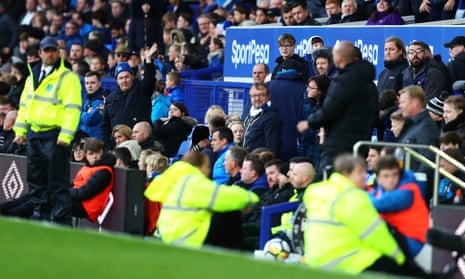Summer is a time of optimism for fans. The combination of new signings, managers and beginnings is the recipe for a heady, fantastical concoction. Forget about everything that went wrong in the 12 months before, the slate has been wiped clean. Hope trumps cynicism and everything feels possible as the season gets under way, at which point reality begins to take hold.
This isn’t new. One of the more counterintuitive joys of fandom is revelling in negativity to the point where it almost becomes a competition to see who can absorb the most comic ineptitude. Treating incompetence with humour is a way to maintain sanity, like Cheryl David sighing and rolling her eyes at her husband’s latest bout of calamitous behaviour in Curb Your Enthusiasm. The problem with this approach, however, is that everyone has a line and one of the main takeaways from the first two months of the Premier League season is how much unhappiness there is in the stands.
It goes without saying that it is the best and most competitive league in the world; we know this because the man on the television says so. Selling the product has been perfected to a tee. Stadiums are packed, television rights are sold at astronomical fees, clubs are richer than ever and there is little sense the bubble is about to burst any time soon. Complaints about inequality are aired every year, but nothing much is done and people keep buying tickets and tuning in. Harking back to a supposed golden age is, well, a bit passé. Ten years ago people were grumbling about the dominance of the Big Four, while Manchester United won everything in the 90s. Misty-eyed nostalgia is easier to dismiss if it just seems like there is no pleasing some people.
Despite that it has been possible to detect a growing swell of discontent at the homes of lesser clubs. Boredom reigns in some places, anger in others. It is a function of the same storylines playing out time and again, the inevitable consequence of people looking far and wide for a semblance of hope and not finding any. Dissatisfaction is not everywhere but it is spreading and that should be a concern for those in charge.
Look at the Premier League table and it is quicker to tick off the happy clubs. Manchester is an obvious place to start, while Chelsea are the champions and Tottenham Hotspur have not had it this good since 1961. It is still all new and exciting for the promoted clubs, while Marco Silva has breathed fresh life into Watford and Sean Dyche continues to work wonders at Burnley. Bournemouth’s fans, although their team have made a poor start, have enough perspective to remember the club almost going out of business in 2009.
But the likelihood is that Watford will finish no higher than seventh and it is then that they will find themselves in a position occupied by clubs of similar stature in recent years, peering upwards and wondering without being able to feel the sky’s the limit. It is this stifled ambition that condemns the top flight’s cramped middle, exacerbating their frustration, stripping them of the right to dream of anything grander than simply existing.
Leicester City winning the title two seasons ago could be seen as evidence of English football’s unpredictability, if only that team had stayed together. Instead N’Golo Kanté joined Chelsea, who restored order last year, and Leicester have appointed Claude Puel as their latest manager after the ruthless sacking of Craig Shakespeare.
The beauty of Leicester, beyond the glorious freakishness, was they made everything feel possible. Leicester’s usual rivals looked at them and wondered if it could have been them. West Ham, inspired by the Upton Park farewell, beat every top side at least once and almost qualified for the Champions League; Southampton finished sixth; Romelu Lukaku’s goals made Everton look like they were a good defence away from challenging; and Stoke won plaudits for the front three of Marko Arnautovic, Bojan Krkic and Xherdan Shaqiri. It seemed that increased television money was levelling the playing field.
However the resounding response from the big sides to this insurrection can best be summed up by Manchester United breaking the world transfer record to sign Paul Pogba despite not qualifying for the Champions League. The odds, ultimately, were still stacked in their favour and last season brought us the Big Six, creating a huge imbalance. Every team below Everton finished with a negative goal difference, while six points and a clutch of interchangeable mediocrities separated Southampton in eighth and Watford in 17th.
Southampton sacked Puel because his football was dull. Finishing eighth would normally have been cause for celebration but not when Everton were 15 points clear in seventh and United were even further away in sixth. It had not been long since Southampton had delighted in their team’s thrilling youthful potential but it was never realised. Other clubs reap the benefits of Southampton’s academy and scouting ability. Initially Southampton coped but continual regeneration takes a toll.
The effect is damaging. Transfer fees went wild in the summer but few teams have improved and anger tends to follow when hype is revealed to be empty rhetoric, especially when people are paying so much for tickets and television subscriptions. Everton, cut adrift on their own little seventh-placed island, spent £140m and have managed to get worse. The early excitement swiftly disappeared, leaving Evertonians to confront the futility of it all. Eerie silence fell over Goodison Park during the recent Europa League draw with 10-man Apollon Limassol despite the significance of the game. The only hint of an atmosphere were the jeers at full-time. Having shown no sign of being able to reverse the decline, Ronald Koeman was fired after the 5-2 home defeat by Arsenal last Sunday.
West Ham fans are in a similar frame of mind. The mood at the unloved London Stadium was bizarre during the recent win over Swansea. The home fans booed backpasses to Joe Hart, a short free-kick by Aaron Cresswell and Slaven Bilic’s decision to replace Javier Hernández with Diafra Sakho. The substitute scored the winner but scrappy last-minute wins over Swansea were not in the brochure when West Ham left Upton Park. The frustration stems from there being no sign of them achieving their goal of reaching the next level.
But how is it possible in a league in which Manchester City have a bigger budget for full-backs than most have for an entire squad? The season is young but the evidence suggests it is becoming even tougher for smaller sides to compete. Everyone is richer but the gap continues to widen as the chasing pack fruitlessly try to work out how to make the most of the extra money.
While they get on with that, a six-team mini-league is forming at the top. Standards rise at one end and drop at the other. Rob Smyth put it nicely in the Guardian’s Arsenal v Brighton minute-by-minute report when he said whoever finishes bottom of that mini-league “will probably be the best sixth-placed team in Premier League history”. Alarmingly those leading clubs have been trying to grab an even bigger share of the television money from overseas, further distorting the competition, although Arsenal fans would still be one defeat away from a Wenger Out meltdown and Liverpool would still have to live with the inconsistency that has blighted them for years.
The consequence of financial inequality is less competitiveness, heightening pragmatism. Business priorities take over. Staying in the league, keeping the money rolling in, becomes more important than taking risks. Clubs learn there is little value in trying something new; better to maintain the status quo. It is the perfect environment for a manager with Tony Pulis’s organisational qualities, although the problem with that theory is that people do not get into football for romance of a balance sheet. West Brom are unlikely to go down under Pulis but their fans are bored. Stoke City, meanwhile, have stalled after a bright start. Swansea are bracing themselves for another relegation battle.
Whether any of this matters to the Big Six or the game’s powerbrokers is debatable, especially when the added factor of a hopelessly lopsided Champions League group stage suggests this might simply be the prelude to a European Super League. Yet if it turns out the Premier League is not focused only on keeping a select few happy, it should not ignore the rising dissatisfaction at many of its grounds. People can still vote with their feet or reach for the remote. Cheryl humoured Larry for a while, after all, but she left him in the end.

